#choujin x meta
Text
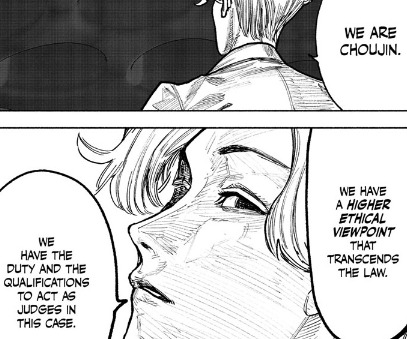
The Great Man Theory of Choujin X
In Crime and Punishment, the 1866 novel by Fyodor Dostoevsky the main character Raskolnikov schemes to murder and rob an elderly pawnbroker. The reason he wants to murder this pawnbroker is not just because he is in debt, but to prove his theory of mankind. For Raskolnikov, all men are divided into two categories: ordinary and extraordinary. The ordinary man has to live in submission and has no right to transgress the law because he is ordinary. On the contrary, extraordinary men have the right to commit any crime and to transgress the law in any way.
We have seen this ethical argument play out again and again in Choujin X in the past few chapters of Choujin X, so I think it's time to take a closer look under the cut.
In Raskolnikov's view extraordinary men are extaordinary they are men who have the gift or talent to alter the world. It is the extraordinary men who forge civilizations to new heights of achievements. Therefore it is the extraordinary man who has the inner right to decide whether to overstep any law or any obstacle that stands in the way of the practical fulfillment of his ideas.

Sato, Tokio's mentor refers to great men of history in a similiar way, as if they were some kind of oppressed class who the laws that protected the masses only hindered.
Choujin, by Sato's viewpoint have the right to transgress the law because the law is made to regulate the masses, that is ordinary humans and not Choujin. By drawing a line between those without superpowers who are in the majority, and those with powers who are in the minority, Sato is dividing humans and Choujin into two separate categories and saying Choujin are inherently superior and have the right to transgress. That he has the right to transgress, because he has a power he was born with.
"I simply hinted that an extaordinary man has the right... that is not the official right, but an inner right to decide in his own conscience to overstep... certain obstacles, and in only case it is essential for the practical fulfillment of his idea (sometimes, perhaps, of benefit to the whole of humanity.) .... I maintain that if the discoveries of Kepler and Newton could not have been made known except by sacrificing the lives of one, a dozen, a hundred or more men, Newton would have had that right, would indeed have been duty-bound to eliminate the dozen or the hundred men for the sake of making his discovery known to all of humanity. But it does not follow from that Newton had a right to murder people right and left and to steal every day in the market. Then, I remember, I maintained in my article that all... well, legislators and leaders of men, such as Lycrugus, Napoleon, and so on were all without exception crimminals [...] in fact many of these benfactors and leaders of humanity were guilty of terrible carnage."
What Raskolnikov is describing here fits the description of the Nietzschian Ubermensch to a T, and in fact it was Crime and Punishment that served as an inspiration for Nietzsche's philosophy.
However, Raskolnikov in the book is far from the Nietzschian ideal. He's described as perpetually gloomy, overly anxious, constantly sick, he's incredibly in debt, barely leaves his house, faints at the drop of a hat. He's no crimminal genius either as when he finally pulls off the crime that he spends the first third of the book plotting he (1) makes a mistake and has to kill a witness, (2) doesn't even rob the pawn broker just grabs a bunch of her stuff and runs (3) takes all the jewlery he took and buries it under a rock and never touches it again.
Clearly, we're working with a crimminal mastermind here.
"A hundred thousand good deeds could be done and helped, on that old woman's money which will be buried in a monastery! Hundreds, thousands, perhaps, might be set on the right path, dozens of families saved from destitution, from ruin, from vice. Kill her, take her money, and with the help of it devote oneself to the service of humanity and the good of all. What do you think, would not one tiny crime be wiped out by thousands of good deeds?"
Raskolnikov's logic is that he will commit one crime and then use the money for the betterment of humanity, only to axe murder a defenseless old lady, a defenseless simpleton, and bury that money under a rock. Perhaps there's a lesson to be learned here.
Charity is just Raskolnikov's justification, his true motive for his crime is to prove his great man theory, and that he's capable of being one of those extraordinary individuals that can change the world by having the werewithal to commit a murder. Raskolnikov wants to divide humanity into superior and inferior, extraordinary and ordinary, and he wants to be in the superior category.
"Thank you, but tell me this. How do you distinguish those extraordinary people from the ordinary ones? Are there signs at their births? I feel there ought to be more exactitude, more external definition. Excuse the natural anxiety of practical law-abiding citizens, but couldn't they adopt a special uniform, for instance, couldn't they wear something, be branded in some way? For you know if confusion arises and a member of one category imagines he belongs to the other, begins 'eliminating obstacles" as you so happily express then..."
In the story the police officer who is hunting Raskolnikov begins easily pointing out the many flaws in Rask's theory of dividing people into two discrete categories. Fortunately for Sato, in Choujin X he has something that is determined for him at birth that he thinks marks him above the laws and restrictions of ordinary people.
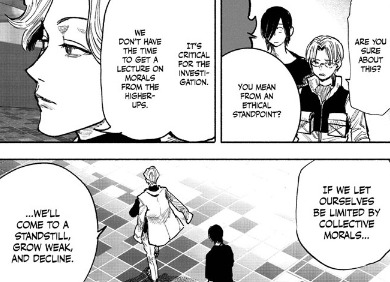
Sato's argument is not that they're going to save more people by taking the route that they're doing, but rather because they are born as Choujin they have an inherent superiority to other people that makes it so the rules don't apply ot them. Having superpowers apparently gives you a moral imperative no matter what those powers are.
Before going further onto the scene I want to remind you that Tokyo Ghoul Ishida's previous work is one of the few works that has ever gruesomely depicted what an evil thing torture is onscreen. It leaves permanent scars in both the main character, and everyone the main character goes onto hurt after the fact.
Jack Bauer Syndrome: Hollywood's Depiction of the National Security Law opens like this.

This "ends justify the means" ideology, or "right to transgress for the greater good" is an idea soaked in our culture, it doesn't just show up in Crime and Punishment and Choujin X. After justifying himself this way, Sato then proceeds to do something which is more or less just torture.

After Palma (willingly cooperating I might add) slices both of her arms up to try to raise a witness from the dead, Sato then orders her neck to be cut open so she can continue to bleed more, in spite of Azuma and later Tokio's protests. The only one who seems to call out his ethical higher viewpoint before he starts torturing her is Azuma.
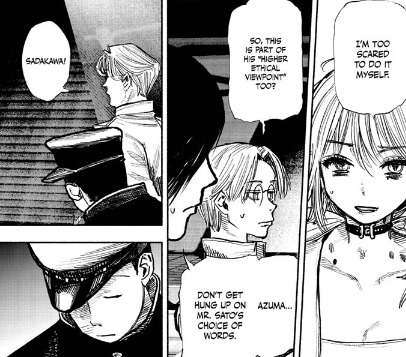
Now, let's say that everything didn't go Sato's way. If Palma just died, or if she'd chaosified and hurt or even killed everyone in the room would Sato have faced any sort of consequence whatsoever? Was he willing to take responsibility if things went wrong? Would have he willingly gone to prison for murdering a person who still has civil rights even if she's currently their prisoner?
I doubt it.
You would think someone with a higher moral imperative, would also hold themselves to that same ethical standard. However, for Sato freedom from restraints under the law also seems to mean freedom from consequences. If Palma had died here, then I doubt Sato would have faced any legal consequences for his actions or have had his power restricted in any way. So, isn't it lucky that everything just happened to work out?
Choujin X seems in part to be deconstructing this very Jack Bauery "It's okay to torture people because that was the only way to stop the ticking bomb and save everyone, and the ends justify the means every single time" kind of logic, with it's discussion of fate, prophecies and Yamato Mori, and Sora Shihouin's role in history.
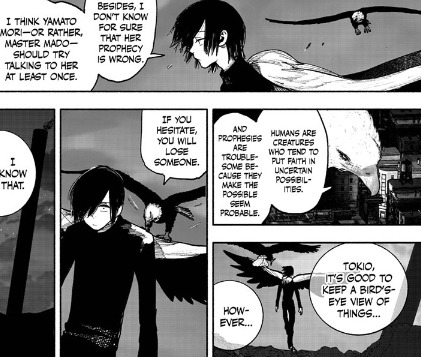
The bird that Tokio talks to is the first character to put the suggestion that maybe none of the prophecies true, they're only true because people have faith in them because they want to think there's a sure thing in life.
Sora's absolute confidence in her prophecies and the ideas of a pre-determined future, lead her to committ atrocities in the name of averting future disasters she is absolutely sure is going to happen.

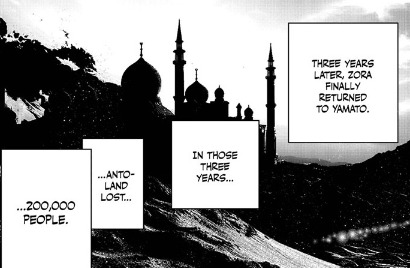
What's 200,000 deaths if Sora was averting the millions of dead she saw in her visions?
From a simple, utilitarian trolley problem perspective if you were to ask most people on the street "Would it be okay to sacrifice 200,000 people if it saved ten million" they'd say yes just based on the numbers. Partially because the human mind cannot even comprehend death on that scale.
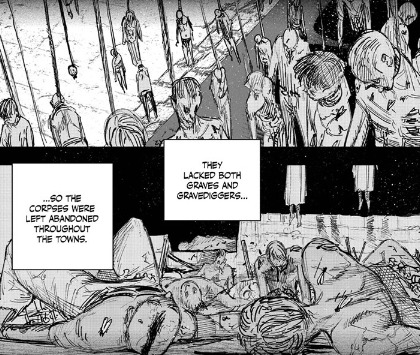
However, the problem with utilitarianism nothing is definite. The ends do not justify the means if the means themselves are uncertain. It's easy to say it's okay to sacrifice 200,000 for 10,000,000 but there was no saying for sure that ten million were actually going to die.
Sora saw one thing. Mado saw another thing. For all we know they could have both been wrong. There's no indication that Choujin X takes place in a deterministic universe with a fixed future, especially since there are multiple seers having different visions which would imply the opposite of that. That there's not one predetermined fate. Sora went and killed those people on the hypothetical possibility that there MIGHT be a disaster in the future she was trying to avert.
Sora was Jack Bauering all over the continent of Anitise. She had to torture those people, otherwise the bomb was going to go off. That only happens in fiction though, becaues study after study after study shows up torture and abuse in prison does not in fact save the day. For the most part it doesn't even happen under dire circumtsances, it happens because guards, police, and authorities are give too much power under the people they keep imprisoned. It's not an ethically dubious way of attaining information to save the day, it's just a common, everyday, abuse of power.
Sora believes just as Sato does, that having power gave her the inherent right to transgress.
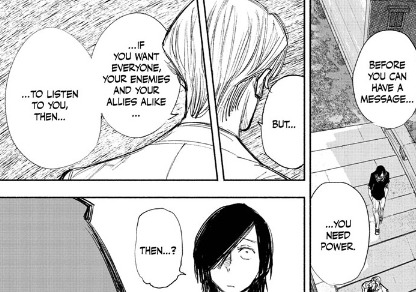
Sato is beginning to more and more hint that the power that Choujins have give them the right to transgress. In a sick way Sora began to mirror Queem in her actions later on in life.

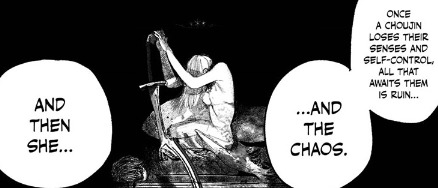

They both became opium addicts. They both fought and fought and fought until they lost the ability to maintain their human form. They both invaded someone else's sovereign territory, instigated a war, and then committed genocide.
Most of all they both believe in their own superiority. While Queem believed in Choujin Supremacy seeing himself as a conqueror and a warlord, Sora has a savior complex, invading foreign territories under the dubious reasoning of "saving them" and committing atrocities that look like modern-day religious crusades.
Why did both of them do what they did?
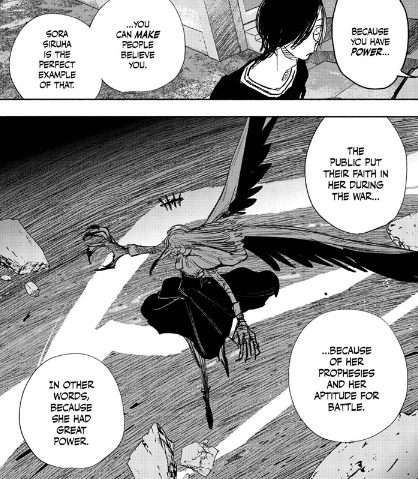
Because they believed the power they had gave them the right to transgress, and because other people who believed the same went along with their actions and helped them.
#cx meta#choujin x#sora shiunin#azuma higashi#tokio kurohara#choujin x meta#choujin x spoiler#choujin x 49.3#cx 49.3
58 notes
·
View notes
Text
Good manga often come with their own share of lore. It extends deep like the roots of a towering tree. Choujin X is one of those good manga that has a very thought out and extensive lore surrounding its plot.
To make it easier to keep track of everything I have created a detailed timeline for Choujin X. Please do check it out and let me know your thoughts!
5 notes
·
View notes
Text
ishida in tokyo ghoul:


ishida in choujin x:
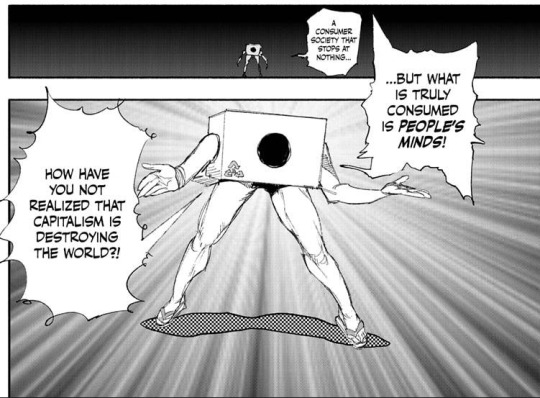
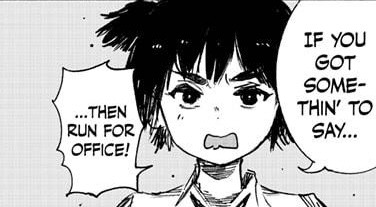
#i haven't caught up on choujin x but this was like one of the first things to pop into my head when i read this#mr. ishida ur funny but i don’t know if you understand how much cardboard man will not be able to fight capitalism through internal politic#as an example the japanese communist party controls so little of the government they won’t get a single policy passed without concessions#so this is a false hope ur having ely give cardboard man (and those who agree with him)#idk#tg meta? not really but hey#tokyo ghoul#choujin x
28 notes
·
View notes
Text
Choujin X Chapter 35 ~ To The Future..
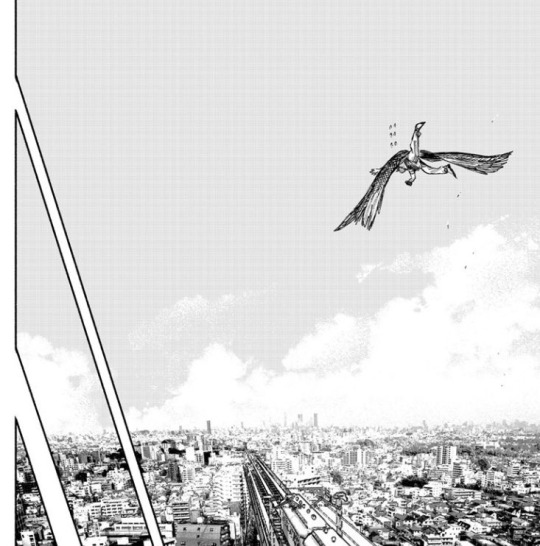
Tokio flying to his training destination, Iwato. (It’s 10 days away by train.)
The newest chapter of Choujin X has become my favorite one in the series so far. Tokio’s coming of age story has been one of the best I have read in recent years, and I’m not surprised due to Sui Ishida being the mangaka. I’m just utterly impressed with how this chapter was handled, so bare with me as I express how GREAT this chapter was.
“Since I might try to lean on them again…”
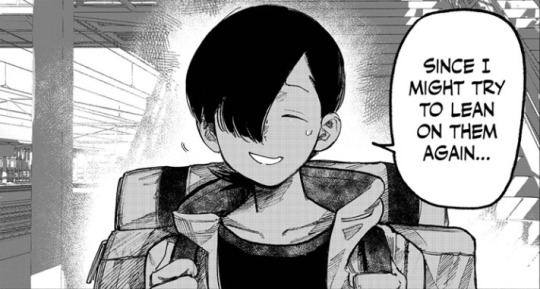
The first thing I want to talk about is Tokio’s personal journey through this chapter, leading up to him leaving Yamato. All of it is somewhat bittersweet, as we see Tokio try to explain to his sister his idea to quit school – to no avail. She outright doesn't accept it, even talking to him in a condescending tone, throwing the fact she and his father pay his tuition. This type of attitude is a crucial enabler to Tokio's sense of self depreciation, and it was what kept him from being his true self.
This isn't to say that his sister doesn't want the best for him, nor doesn't want to support him; it shows that she never understood Tokio's true potential (neither did Tokio). Since his sister has not seen nor understand what Tokio has experienced in the past few months, it makes since she would be adamant against him quitting school.
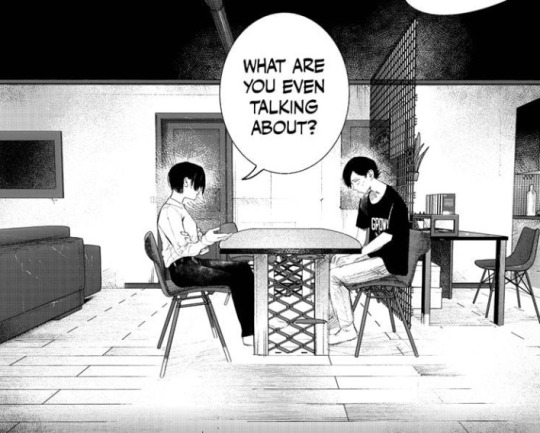
I think what also makes this moment difficult for Tokio is that he doesn't want to scare his family. When his sister asks what he wants to do, he thinks of Zora, but doesn't say anything out loud. It's a heavy burden to tell your family you are leaving, but not be able to really explain why. It makes him look indecisive, and clueless to where his life is going, but it's quite the opposite. Everything Tokio has experienced since Ch 1 of Choujin X, has built him up for this moment.
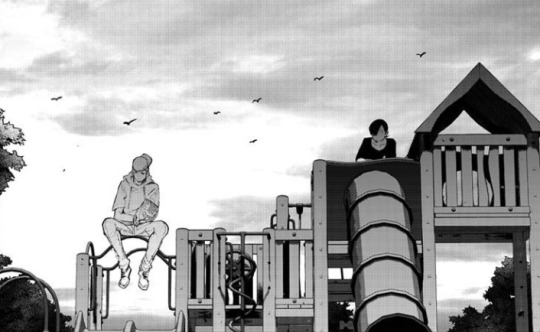
Due to this difficulty, Tokio seeks some type of confirmation for his goals through Shiozaki, which represents Tokio's decision to stop relying on Azuma and Ely. He doesn't go to them to decide if he is really going to quit school; while he contemplates, the latter discuss if he's really going to leave between each other. I think it's incredible how Ishida is writing this trio and their dynamic. I won't say too much in this section, but Tokio's talk with Shiozaki showed that he no longer wants to lean on his friends. He wants to fly high on his own. I admire this in Tokio, because it shows how full circle he has come. I have so much more to talk about with Tokio's Growth, but I'll save that for a post of its own soon!
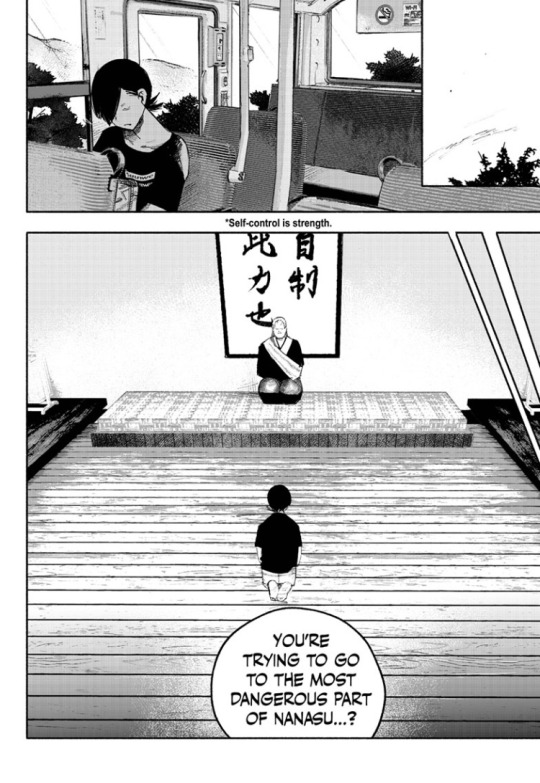
(The fact he wanted to go to where the choujin crime rate is at its highest is insane. Drastically different from what the tokio we were introduced to would do.)
Tokio's biggest weakness was his reliance on others. He has fully recognized that now and in a very sad moment, literally excludes his friends from his decision proves how serious he took this moment of training. He was not only prepared to train his powers, but his own personality as well. It was great seeing Tokio fly high in the sky towards his future, and also towards the person he always wanted to be.
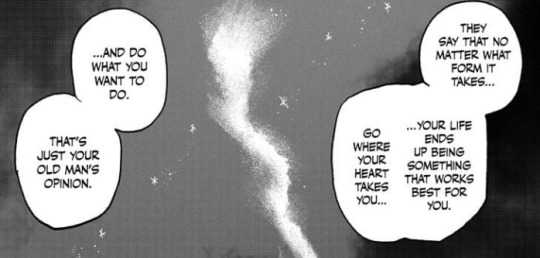
(The conversation with his dad was amazing, and I want to talk about that as well, but I'd be rambling on forever, so I'm saving that for tokio's growth meta)
Azuma & Ely's Growth
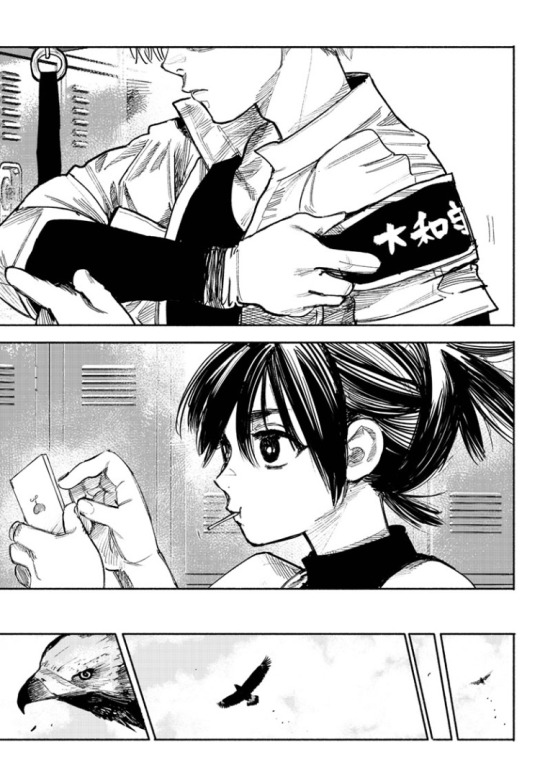
Azuma & Ely (Timeskip)
The thing that surprised me the most about this chapter was the montage that showed Ely and Azuma's new dynamic. It is incredible that Ishida decided to take away dialogue for the second half of the chapter and just show a montage of their reaction to Tokio leaving and their decisions after. It adds heavy dramatization to every thing drawn, making you pay attention to every detail. Ishida's symbolism shines through with the bird's nest being drawn to represent the trio, but I feel like this montage showed us exactly what we needed to see to understand their growth.
Azuma takes Tokio's leave the hardest, seemly (makes sense) due to the bond that the two shared through their childhood. I think what really stings for Azuma is the deepening of Tokio's “difference”. I think Azuma has accepted that him and Tokio were made differently, however Azuma still longs to be a Hero with him. Azuma went from seeing Tokio as a secret rival (and his protector), to realizing that Tokio didn't need a hero. Now he wants to be by Tokio's side as he gets stronger, but Tokio cannot do that because of how strong his self depreciation is.
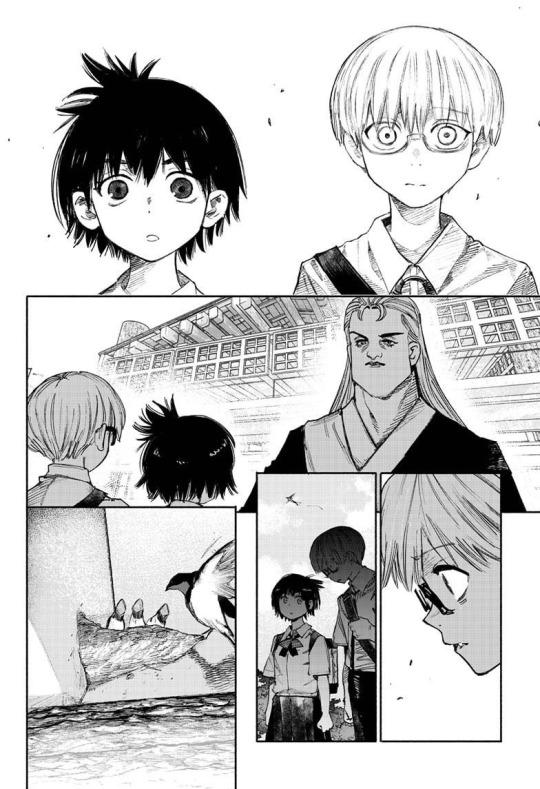
That's what makes Tokio's leave so bittersweet. You are proud his is growing, but you understand why it hurts Azuma and Ely. Azuma saying, “Is that something you can only do by quitting school?” shows that Azuma wanted Tokio to stay by his side. The truth is, Tokio does need to quit school to achieve this, because he isn't talented in the way that Azuma is.
Based on the way the montage was drawn, it seems to me that Ely and Azuma spent some time separate from each other initially after Tokio left. That was until Ely seemingly required help to study. I love seeing them become closer, developing a relationship with each other. It would suck for them to experience all of these crazy events, to treat each other like strangers.
(Not to mention the political campaign that was shown in the montage as well. It seemed like a huge thing in the aftermath of Omega Tower.)
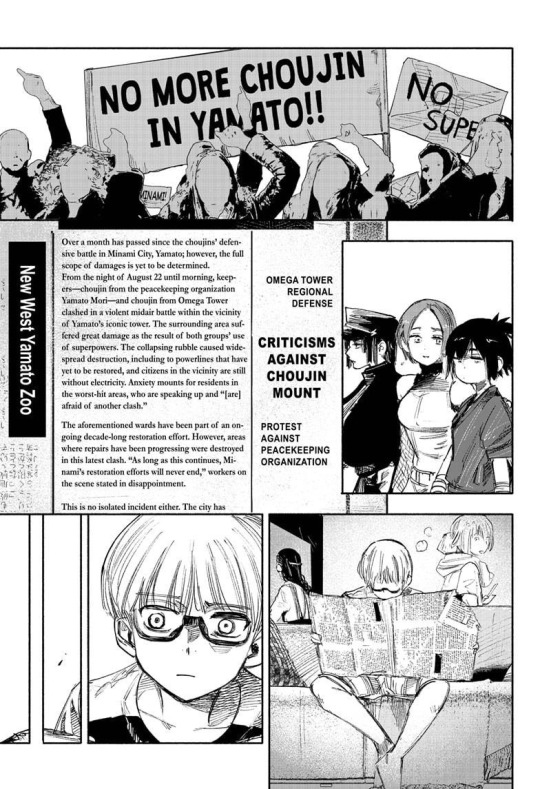
Ely goes back to her hometown to speak to her grandfather then seemingly flies back to Yamato, a beautiful subtle parallel for Ely and Tokio's characters. We see Ely interested in buying a phone, so she gets a job at McDonald's (lol), and that's where she runs into Azuma again and the two hit it off like old friends. We even get a bit of the two doing martial arts training together, on top of seeing Azuma's ability to create a gun with his ability. I loved all of this, especially seeing Ely getting into some martial arts because her theft ability would be insane if she had strong martial arts skill behind it. (Not to mention what she can do with the smoke). Seeing her and Azuma looking like they have hit their young adult stage is giving me chills. It's hard for me to tell how much time has passed because they look like they've put years on, lol.
To The Future..
It is unclear to me how our trio will reunite after this separation period, but I'm extremely excited for it. So much has happened, and even more has happened off-screen. How will Azuma and Ely react to seeing Tokio again? But also, will the next chapter take us straight to a reunion, or will there be some time apart, so we can see Tokio's growth alone? I'm Ishida will have the perfect way to bring everything together.
Tell me what you thought about this chapter in the comments!!
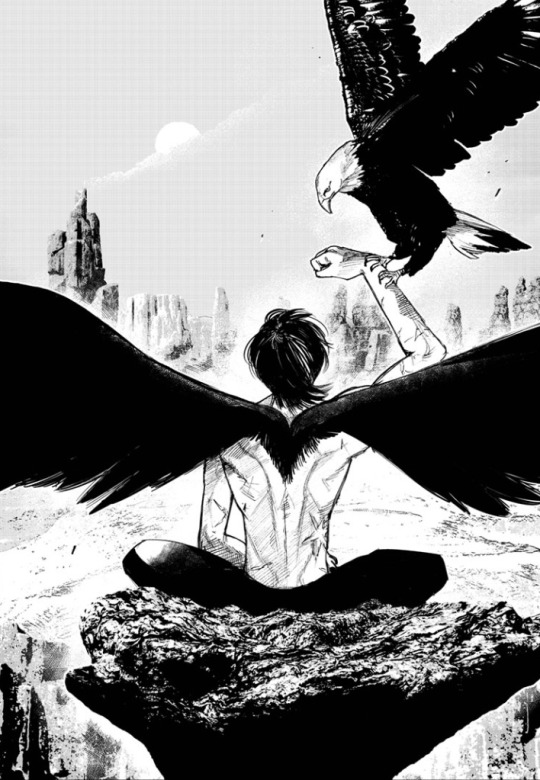
27 notes
·
View notes
Note
as someone who read tokyo ghoul back in high school and stumbled upon your blog, i'm glad i found you again.
i did end up dropping tokyo ghoul because of the way i felt about kaneki, the way ishida handled touka (romance has always been tricky for me to grasp lol) as well as the way some sensitive topics were handled lol maybe i'll check out ishida's next work if he ever releases anything.
regardless, i hope you're doing well Kate! i'm planning on watching rwby, so i can't wait to get back to you about my thoughts if that's okay! your metas have been making me so curious, so i had to bite the bullet lol
Aw thank you for your kind words!! I would love to hear your thoughts on RWBY! As for Ishida, he has been releasing Choujin X, which I need to catch up on.
8 notes
·
View notes
Note
Have you ever considered reading Tokyo Ghoul. The anime was butchered but the manga is my favorite. It's more horror and adult. But the lines of good and bad are definitely muted. You get to see why both sides do what they do and just because a certain group "protects humans" doesn't make them good. And ghouls aren't all bad There's also some family drama with one side character and just so many amazing characters. And oh is there tragedy, one in particular has something done to him that...well I won't spoil it but I think you'd really love it. There is some torture in it just to be warned. Annyywhoo have a perfect day 🌸🌻
So I made the mistake back in 2020 of watching the Tokyo Ghoul anime.
Obviously I was confused when I was done, so I googled some things. And at that time I had discovered a few tumblrs on here who had discussed Tokyo Ghoul in depth and decided to read their discussions on it.
I had considered reading it because I know it’s more mature and dark, and I know it has a relatively happy ending.
Unfortunately though I already know most of the details of what happens—due to the combined knowledge of the anime, Google, and peoples’ metas on here.
I also know that one character who probably should have had a better ending (Rize) simply doesn’t get one. Which given what I know she is put through, leaves a bad taste in my mouth. Or at the very least, I’ve read that the way her story plays out--whether it’s an appropriate ending for her or not—is really dissatisfying.
So while I don’t have first hand knowledge of all the details of the manga’s events, I know a decent portion of what happens. (I read a lot on Rize’s arc which was just 😕)
I am reading Ishida’s Choujin X though (I need to catch up on it as I was giving it time to release more chapters). So if that turns into another major hit, I’ll be following it.
7 notes
·
View notes
Text
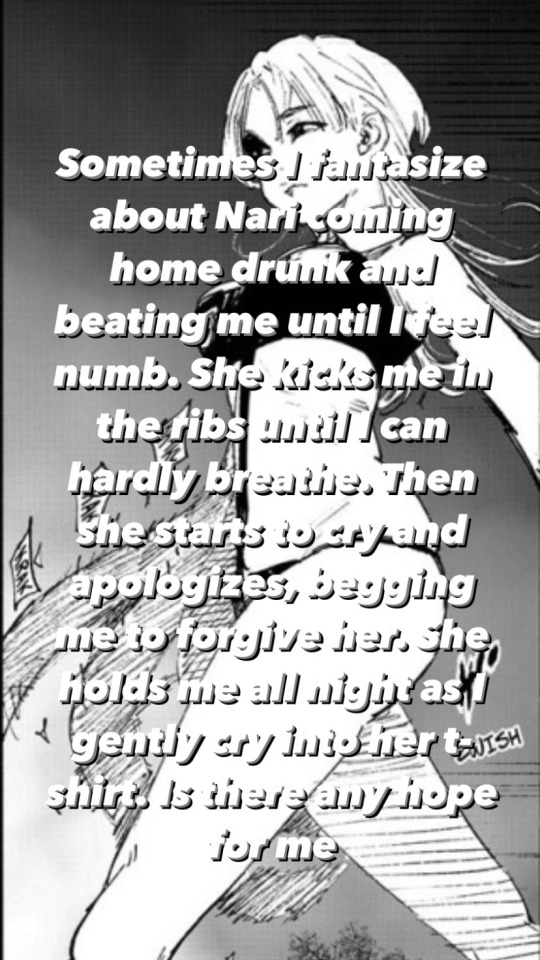
Is there any hope for me?
#oc#lmao#choujin#choujin x#azuma higashi#nari#ely otsuta#tokio kurohara#tokyo ghoul :re#Tokyo ghoul#choujin x meta#simon kagomura#meme#choujin x meme
10 notes
·
View notes
Text
also tokio's rant about angles might be actually a reference to the conflict between apollonian and dionysian forces in western culture.
or not :)
#choujin x#ishida sui#look i know too little about it but if this is supposed to reference nietsche then :)))) *screams internally*#chx meta#gadanie#tg
6 notes
·
View notes
Text
I just read the Choujin X chapter AND REALIZED IM PROBABLY GONNA HAVE TO WRITE BIOLOGY METAS, AGAIN
24 notes
·
View notes
Note
What do you think of Sora Siruha character?
Before this chapter, i thought Ishida seems wants us to think of her character as a tragic hero and a character that is fallen after leaving yamato mori, but then he drop a chapter where she committed genocide when she was still in yamato mori, so i wonder what do you think of her character?
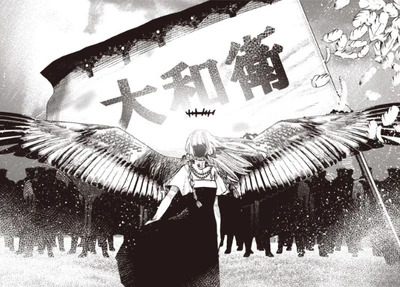
Sora Siruha is an interesting character because Nietzsche would have hated her. Yet she's still seen as morally ambiguous by both characters in her own story and members of the audience. Not that you're wrong to see her that way but Nietzsche sure did hate it was religion. So, perhaps the literal nun, with angel wings, with cross tattoos, and a black halo that doubles as a crown or thorns might be a bad guy in the Nietzsche manga.
That's not to say that she's irredeemably evil, it's just ironic the Choujin X of her generation named after the "ubermensch" represents the antithesis of a lot of Nietzsche's ideas.
Nietzsche famously called Religion the opium of the masses. in Nietzsche's view suffering was not only good but necessary to life, because it aspired people to grow and anything that promised avoidance of suffering alcohol and religion for instance stagnated growth instead of promoting it.
Religious suffering is at the same time an expression of real suffering and a protest against real suffering. Religion is the sigh of the oppressed creature, the sentiment of a heartless world, and the soul of soulless conditions. It is the opium of the people.
So, it's not coincidence in the Nietzsche manga that Sora who has so many religious associations tied to her is also, an opium addict who cannot survive without it's pain numbing effects.


If by Nietzschian philosophy pain is a part of the human experience, then by losing her pain, Sora Siruha also lost her humanity which is heavily implied to be part of the cause of her mental spiral.
One other thing associated with Sora is that she uses what are primarily utilitarian views to justify her atrocities - something else that Nietzsche hated as a philosophy.
So Sora believing that her future visions will come to pass goes on to committ atrocities in order to avoid even greater atrocities. Let's say that her visions are in fact one hundred percent correct. That Sora killing 200,000 people would avert the deaths of 2,000,000 or more.
Sora's reasoning in this case is purely utilitarian.
Utilitarianism actions are morally permissible if: They produce at least as much or more net happiness as any other available action. Everything should strive for a balance of happiness over suffering.
By Utilitarian reasoning her actions are morally permissible. Sora herself does not want to kill Anitise, she takes no joy in it, but she believes like any utilitarian she's responsible for bringing the most happiness over suffering to the world.
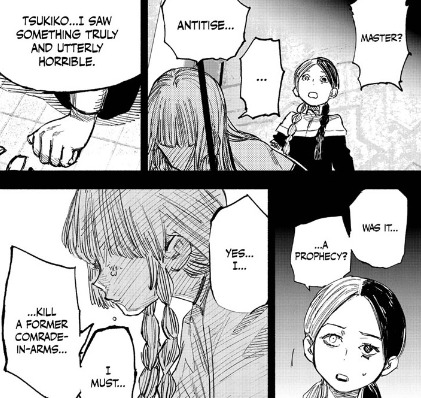
However, even if Sora's vision was 100% correct and by pulling the lever on the trolley problem and killing 200,000 she saved 2,000,000 Nietzsche would still have a bone to pick with her moral reasoning.
Nietzsche famously hated Utilitarianism. because it ignore the value of suffering, which strengthens the man. He saw that doing every and all actions for the sake of the "greater good" was something that denied the individual and discouraged individual development.
Nietzsche's criticism is that value is not something that can be quantified or proven. You can't mathematically measure in an objective sense, the suffering caused by your actions, the benefits caused by your actions. There's no universally agreed upon value for human life.
What is the "unit" of one human life?
Why are the 2,000,000 people that Sora saved more worthy of life than the 200,000 that she killed. What justification can Sora have other than "that's a smaller number." A person among the 200,000 killed could have grown up to cure cancer. Of course, even if the 200,000 weren't especially talented people, even if they were all going to grow up to work at mcdonalds why are there lives inherently worth less than the 2,000,000 that sora decided to save?
Sora is not a nihilist, she is a pure-hearted utilitarian who's actions are taken to give pleasure to as many people as possible but one more obvious criticism of her moral reasoning in choosing to sacrifice the few to save the many is that she is not an unbiased judge of values.
For example, if Anitise really did become a mad king then who would his victims have been? If he invaded Yamato Mori and killed 2,000,000 then why are the 2,000,000 lives of the Yamato Mori citizens he killed worth more than the 200,000 people that Sora killed preventing his invasion? It would be because being a citizen of and responsible for Yamato Mori Sora is unconsciously biased to put her own nation above Anitise's kingdom. In that sense, she's not really acting for the greater good, but rather the national interests of her country but she's still posing herself as a savior figure.
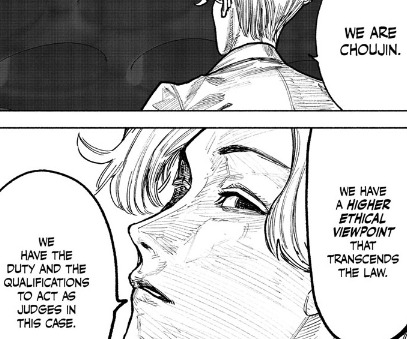
Sora goes on to commit these atrocities, while also continuing to see herself as a savior and believing she's operating from a higher moral viewpoint than everyone else. Yet, you can easily point out where her biases are as I just did.
In addition to the fact that we have no way of knowing if Sora's visions of the future actually are true. The fact that there are two people with future seeing powers (three if you count Tokio's dreams) who can see different things then points to the fact that Sora's visions aren't 100% true. However, even if you give her the benefit of the doubt that her prophecies were going to come true if she didn't do something, you can still make moral arguments against her actions as I just did above this section.
Sora is also extremely biased in other ways. In her origin story, she saw a vision of Queem coming to burn her convent, and was unable to stop it from happening. This clearly has affected her for all of her life, as even when presented with direct evidence that her prophetic dreams might not be true (such as another seer who disagrees with her) Sora doesn't even consider that possibility or hesitate to commit atrocities, because she's still guided by her guilt over being unable to stop her convent from being burnt.
In Tokyo Ghoul, Yoshimura once theorizes that Ghouls and Humans are psychologically the same, but because Ghouls live violent lives they eventually lose their empathy and stop seeing any value in human life as a coping mechanism.
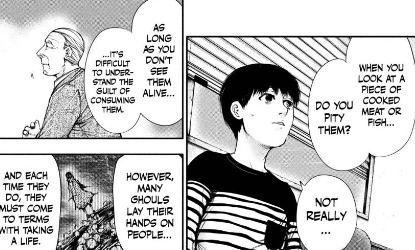
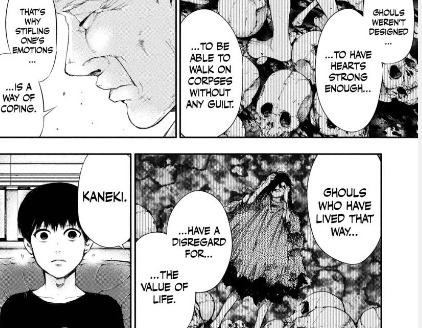
I think Sora's slow corruption makes sense through this lens, not because of her future visions but rather because of the amount of power she had.
Choujin e aren't any different from human psychologically, they experience human emotions, but convince themselves they are different because one they're prone to get in more violent situations, and two the power they wield leads to them developing superiority complexes.
Sora plunged herself into war and had to walk on too many corpses in order to get stronger and gain the strength to fight Queem, but it's clear she didn't stop there after Queem was defeated. After Queem died Sora became the war-monger, and why? Her visions provide us one reason, but like, Sora didn't consider alternative means like diplomacy or warning anitise of what she saw? She just jumped straight to launching a modern day crusade against a foreign country, why?
Was it just easier for her to consider a military invasion because after having been through the hell of war, 200,000 became just another statistic to her?
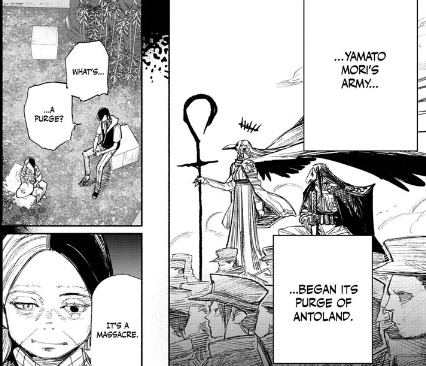
What other reason than she had the power to do so, and Sora's superiority complex told her she had the right to wield that power however she chose to do so.
Sora and her savior complex, provides an uncanny mirror to Queem and his choujin and his choujin supremacy doctrine. Sora may have believed herself invading Antoland in order to prevent a future disaster, but when has a foreign country invading a soveriegn territory "for their own good' ever historically been a good thing. Sora may not have preached choujin supremacy but her actions don't make her too much different from Queem in the end.
Then, there's the possibility that Sora's prophecies might not even be nearly as true or certain to happen as they think they are. One of the birds basically spells it out to Tokio, that humans wanting to know the future is just wishful thinking.
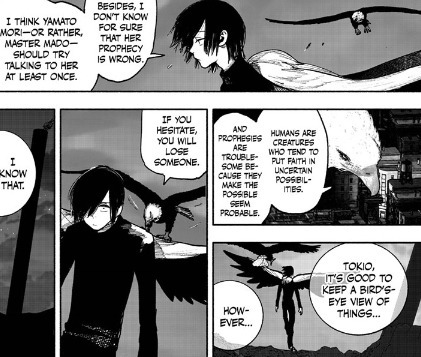
Which puts Sora's absolute certainty in a new light. Is Sora's beliefs in her prophecies just a longing for control, the kind of absolute control over the future that nobody in the world but god is supposed to possess. Sora wanting to take God's place in knowing the future and being able to control her destiny goes all kinds of wrong.
I'm reminded of Attack on Titan where Eren coming into contact with the paths and being able to see the past, present and future at the same time doesn't give him godlike power, but reduces him to a helpless child. Eren's ability to see the future ends up bringing into existence similiarly to Sora, a future where he's the one comitting the atrocities.
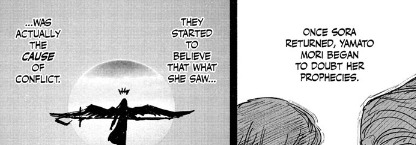
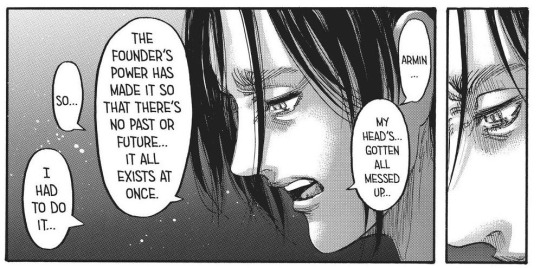
There's also Paul Atreides from Dune who is given the power to see the future, and despite knowing and feeling guilt for a long time that some of his actions might lead to him releasing a holy war against the galaxy and killing billion, goes on to follow the future timeline he saw where he caused those atrocities anyway.
The absolute godlike power to know the future for all three of these characters Sora, Eren and Paul actually leads to them committing atrocities, not averting them as they'd hoped.
Yet, there's the tragic element of the fact she was just sixteen when this destiny was thrust upon her.
In Tokyo Ghoul Eto once referred togod as a child with extraordinary power to justify the world being as messed up as it is. Doesn't this fit Sora Shihouin as well? A child given way too much power and suddenly thrust into a leadership position?
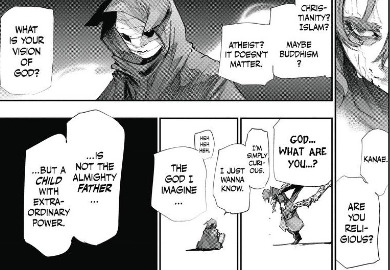

In that way Sora reminds me tragically of X-Men characters like Jean Grey, if someone is given the power to see the future, or the insane powers of the phoenix that Jean Grey was given would they really have the moral fiber not to abuse that power? Can anyone wield that much power and not be corrupted by it?
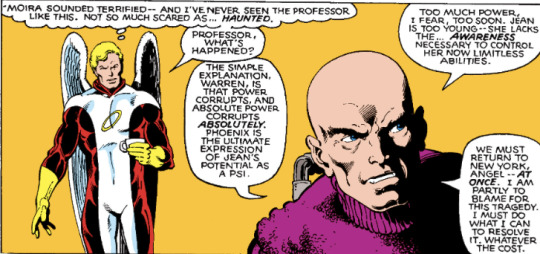
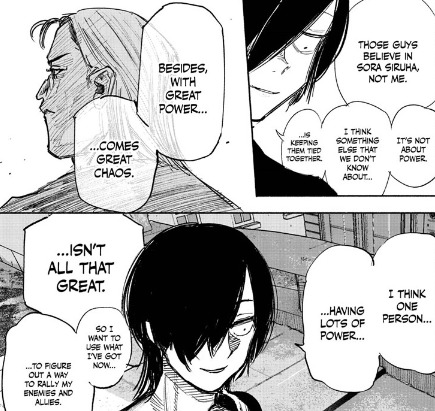
24 notes
·
View notes
Text
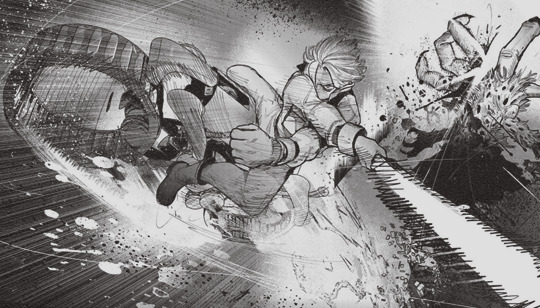
CHOUJIN X, CHAPTER 41 HYENA
Hello, it's time to cover the climactic battle and rescue of Palma a recently introduced character who will probably turn out to be a major player considering the sheer amount of time that has been spent on this battle. This is also the first time we've seen the trio truly work together in a fight since they got separated before the time skip so there's a lot of interesting character and thematic moments to dig in here.
I think if there's any central statement that Ishida is trying to get across in this long drawn out fight scene it's that old cliche.
GOOD INTENTIONS LEAD TO HELL.

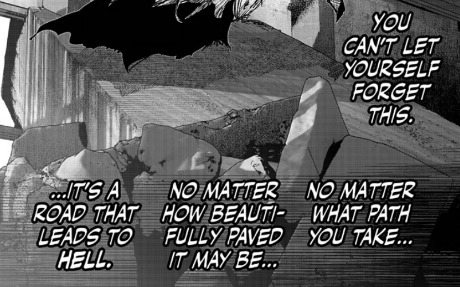
Tokio's mentor Sato reminds him of this. While he is trying to make Tokio into the successor of Sandek because of this heroic and selfless attitude he has, he's also the ahrshest critic of that same attitude. That no matter how hard he fights, or how beautiful the path he walks, or what his ideals are intentions are not outcomes.
The power of choices is a common theme in Ishida's works, often used with a railroad motif at the same time. We are capable of making choices, we are capable at switching tracks at critical junctions too, but oftentimes there are unforeseen consequences for our choices and because of that no matter how much you overthink a choice it at times feels like you've been railroaded into an unexpected result. There is always a choice and always a consequence, and sometimes these things aren't fair or just or logical.
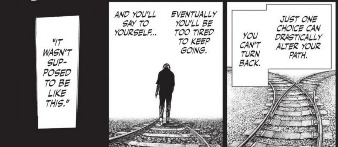
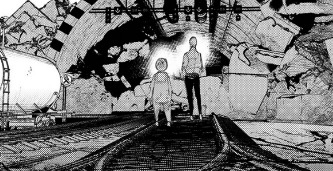
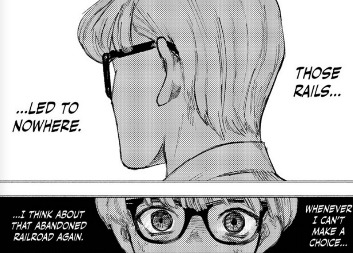
Azuma makes a pretty clear reference to the train tracks monologue in Tokyo Ghoul when he's going to fight the scissor choujin to try and rescue Tokio. In both cases protagonists make a wrong choice that they are then locked into for different reasons. Kaneki correctly understands that Furuta might raid his home base, but instead of splitting his forces appropriately goes alone.
Azuma similiarly is told he can't handle fighting against a Choujin and to stay out of it, and goes anyway. In Azuma's case he's told straight up to his face that his intentions aren't as noble as he makes them out to be. Did he want to save Tokio because he wants to be the kind of person who save others, or did he just want to test himself because he thought being put in life threatening danger would activate his choujin powers?
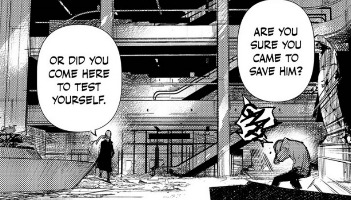
The road to hell is paved with good intentions can mean two things, number one good intentions don't always lead to good results or number two people's good intentions aren't always as good as they make themselves out to be.
Tokio post timeskip is so far shown to be true to his good nature. However, he is an Ishida protagonist and Ishida doesn't really write straightforward heroes. There is a similarity between the two scenes as I mention, Azuma and Tokio both willingly choose to charge into fights that are far out of their depths and they're warned beforehand that while sitting and doing nothing might seem crueler it also might be the smarter choice and they might make things worse by intervening. Tokio is told that he was the one who asked to take the lead on this Opium operation and now he might throw it all away to save a random stranger by charging in with no backup.

When Tokio is fighting he's able to hear Palma's cries for help in her chaosified state because of their shared connection to Zora's blood and we see he is forcibly flashing back to critical moments of his life. The scene on his beach where he made the decision to leave his life and friends behind for one year and devote himself entirely to training. The memorial for the dead he left behind in his final battle where he beat the tyrannical choujin yes, but lost most of his allies.
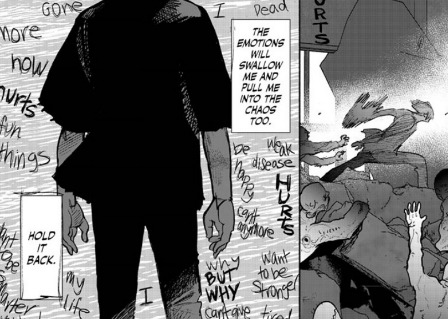
The text are Palma's thoughts, but they are probably things Tokio highly identifies with because they're things he's said in his personal narrative before (I want to be stronger, I want to smarter, why am I weak? i can't anymore? Why? I can't give up) something that has even appeared to us in his internal dialogue right before the timeskip.
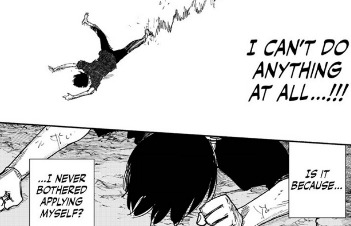
Palma is lamenting her fate, how weak, useless and helpless she feels and how it feels like nothing she did amounted to anything and begging for help while at the same time succumbing to her berserk state. Part of me wonders if Tokio is overinvested in saving Palma not because of some higher mind heroic goal, but because number one a year later he's still stuck with the feelings of uselessness he had on the beach from watching everyone fight and die for his sake. He's stuck with the idea that if he does not do everything on his own from now on that he'll revert to his old useless self.

Is Tokio trying so hard and so recklessly to save Palma because it's the right thing to do? Is he doing it because their psychic link makes him project his own feelings of uselessness and helplessness onto her? Is it survivor's guilt from all the people he couldn't save in Iwato?

Is it because Tokio like Kaneki hates being made to feel weak or useless so at moments like this he will act on his own and act recklessly so he can pretend he's in control. I think these chapters in general are setting up more for Tokio's character, at least to add a level of complexity because really importantly if Azuma had not shown up when he did Tokio would have completely lost.
It's also narratively interesting to me how this scene compares to when Azuma charged in blindly to save Tokio from the scissor choujin when he was warned against it. In that case Azuma's good intention truly did lead to hell because he got the worst result possible. Not only was he brutally cut in half and didn't succeed in helping Tokio at all, but he also turned into a Choujin and immediately brutally attacked the person he was trying to save. Azuma wanted Choujin powers too but when he awakens he's immediately told he's dangerous and needs to control himself.
Things just don't work out for Azuma narratively. That's always been the case since the beginning. The things Azuma wants get just kind of dropped into Tokio's lap. Tokio has more potential as a Choujin. Tokio awakens first. Tokio has spent years slacking off unlike Azuma who was a martial arts prodigy and overachiever, and in just one year of hard work Tokio has far surpassed Azuma. Tokio is Sato's star pupil, while Sato remarks to Azuma's face that Yamato Mori's quality of peace keepers is on the decline. Tokio is put in charge of a large operation when he speaks up against his superiors, whereas Azuma's attitude is keep your head down and listen to your superiors and he remains in relatively the same place.
Tokio is the protagonist so the story moves forward with him and it's about his growth, whereas Azuma is continually frustrated by both his lack of mobility and lack of growth. SO in this scenario where Tokio and Azuma basically do the same thing, run in to fight without backup Azuma's ends with this horrific scene of him turning against his best friend and even losing his status as "Tokio's hero" while Tokio gets to fly off into the sunset with Palma.

I'm not saying Azuma deserves better anything, I'm just observing that things work out for Tokio and they don't really work out for Azuma. Tokio keeps movig forward while Azuma stays in place and is oftentimes left behind. That's what Azuma long suspected and feared that if Tokio put the effort in that not only would he be on Azuma's level, but he'd be much higher than him.

It's why Azuma freaks out on Ely for not taking his side in the conflict between him and Tokio. In Azuma's mind at least everything he wants, Tokio just already has. Ely doesn't mind that Tokio ditched her for a year because she's more relaxed about those kinds of things. Not only is Azuma more sensitive he's also known Tokio for all of his life as opposed to Ely who only met him recently. From Azuma's point of view though the connection he's built up with Ely for the past year as her partner means almost nothing because he thinks she's naturally siding with Tokio, because Azuma fears Tokio's just naturally better. That there's something internally missing in Azuma that Tokio has and that fear makes him play stupid high school games with Ely. "Well, why are you on his side? You're supposed to be on my side" he yells in the middle of an important mission even though hes supposed to be the most mature and goal oriented member of the main cast.
Of course, there's the fact that Tokio didn't save the day in this situation because of anything he did specifically, besides making the decision to save Palma and not give up on that even when things were looking bad. No the day was saved because Azuma and Ely showed up and they were only there because Azuma considered Palma suspicious and was following up on a lead he established beforehand. It's Azuma's detectivework that brought them there, and luck to salvage things after they went south and Tokio wasn't strong enough to handle it, not anything Tokio did specifically.
It's still a pattern though Tokio tends to get good outcomes, and Azuma tends to make choices that lead to bad ones. I'm curious as to why this is though I don't think it's going to settle on a simple answer like Tokio good, Azuma bad.
Sato's heavy emphasis on "good intentions lead to hell" makes me think that the happy ending to this chapter mini-arc might get the rug pulled out of it at a later event. Palma turns into a hyena, and Azuma had a lot of connections to hyena symbolism early on in the manga.
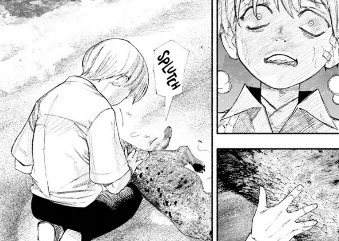

Something tells me we might get a scene like this with Azuma and Palma at a later point, that the happy ending with Palma now might somehow lead to a tangled tragedy in the future. It might even be a romantic thing, because Azuma's jealousy over his perception that Ely is taking Tokio's sides has shades of romantic jealousy and possessiveness to it too. I'll talk about this theory more when I'm analyzing all the reveals in the next chapter though.
33 notes
·
View notes
Text

Choujin X, Chapter 40.2 Thoughts
New chapter! New development for Palma Shishinegura's plotline along with the artificial choujin making experiments that Batista was having her conduct. I've got a lot of thoughts on her Choujin Form, especially the fur. Those are hyena spots on the fur which might be further evidence of her eventual connection with Azuma.
Shoujo with Corpses

Meet Palma Shishinegura first introduced to us as the Choujin zombie maker. Her ability lies in her blood which when transfused into corpses reanimates them into an undead state. She is first introduced in a throwaway panel that shows her walking with a corpse on her back while the plane Azuma is in crashes. In her second appearance she hears the details of her plane crash on the radio.
This timing could be foreshadowing an eventual connection between the same characters. Supported by the fact they've already encountered each other by coincidence when they were both searching for corpses from the plane crash on the same beach.
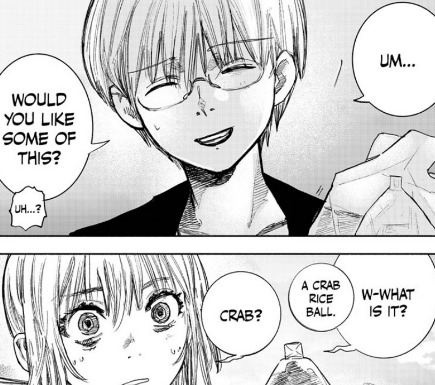

An oddly friendly encounter between an illegal back alley doctor that specializes in necromancy, and a Choujin who works for Yamato Mori the kind of organization that would hunt her down. They are also two characters who've been associated with Batista. Batista the masked Noh Face took a marked interest in Azuma on several occasions, and he also regularly does business with Palma.

However, their biggest connection revealed so far in this chapter is the hyena spots that apepared on Palma's choujin form after she mutates. The hyena was a reoccuring symbol who Azuma encountered several times during the period his Choujin powers had yet to awaken.

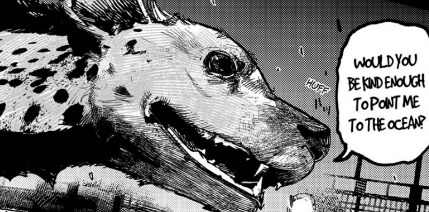
The second time they encounter one another, the Hyena asks Azuma directions to the ocean. Thi is right before his pseudo-death and reawakening as a Choujin. Azuma encounters the Hyena one final time after his battle with Tokio.


He finds the same Hynea dead on the beach being picked fed on by birds. The scene causes him to have a near breakdown as he shoos the birds away and breaks down crying over the corpse. Originally I just assumed Azuma's breakdown had more to do with his feelings over his awakening and his inability to return to his previous friendship with Tokio now that the both of them have changed.
However, what if this scene is also foreshadowing. Azuma also encounters Palma for the first time on the beach, and she's now associated with the same imagery of a hyena. What if this is foreshadowing a future scene or even a climax of their relationship. They meet again at the beach and Azuma witnesses her death (perhaps at the hands of Tokio because of the birds that were feeding off her corpse). Ishida may have already shown us how the entire scene is going to play out this early in the story. That would be some master class level foreshadowing.

27 notes
·
View notes
Note
Your Choujin X writeups are great, it's a shame the fandom is so small that they get relatively few notes. I'm glad you appear to have a more sympathetic view of Azuma than most CX readers I've seen. I think I remember you predicting before the time skip that Azuma would be the one to leave Yamato Mori, but recent chapters look more like Tokio will diverge from them - any predictions for the how our main trio may be split up?
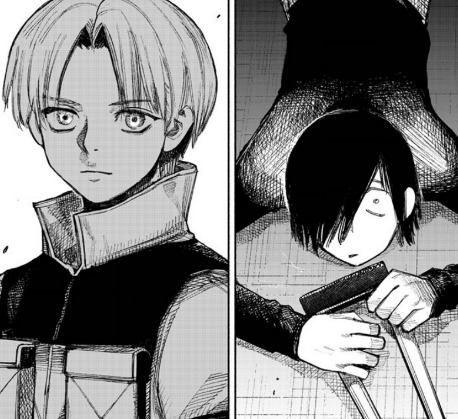
This is a great question anon, and my answer is... I dunno. By which I mean to me it could go either way at this point. Me and my friend have actually debated on this, which one is more likely to side Sora and which one is going to stay with Yamato Mori. I'm still leaning towards Azuma leaving Yamato Mori, but there's evidence for both sides of either Azuma or Tokio leaving. Predictions about the Azuma and Tokio breakup underneath the cut.
Evidence of Azuma Leaving
The first piece of evidence is that Azuma is pretty clearly headed for a negative character arc, to parallel with Tokio's growth. While Tokio grows more self-confident and independent, Azuma in turn starts to feel inferior and resentful. Azuma states it pretty clearly at the end of their first fight, he's no longer Tokio's hero, the relationship they had in the past where he was the one who Tokio looked up to is gone now. Azuma can't really handle the shifting power dynamic because he was as dependent on Tokio as Tokio was on him.
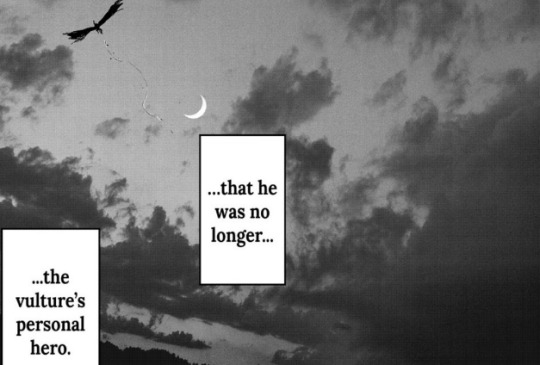
Instead of bridging the gap in their relationship, Tokio leaving has made Azuma even more distant from him. Azuma isn't even on speaking terms with Tokio right now. When he's introduced to Tokio, the first thing he learns is that Tokio freed an entire province from a dictator while Azuma just a few days ago failed to stop a plane crash resulting in the deaths of so many people.
It's not like Azuma wasn't training while Tokio was gone, and yet from Azuma's perspective it seems like Tokio is still leaps and bounds ahead of him. Which could push him to conclude that Yamato Mori is not enough, either out of a desire to be stronger, or personal resentment for Tokio.
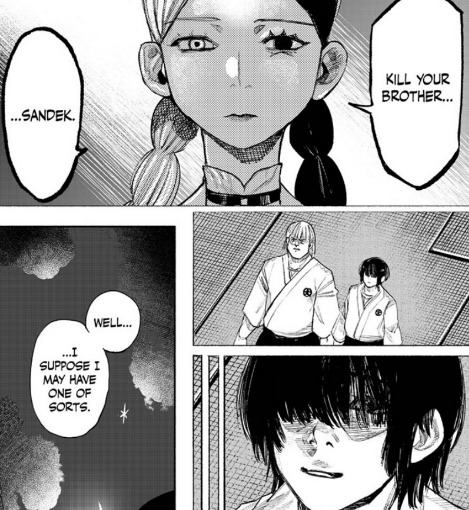
Evidence number two, Tokio and Azuma are a clear parallel to Sandek and Batista. The two of them trained alongside each other to be heroes, probably all their lives, only for one of them to betray the other. Batista is the one who either left Yamori, or fled after his brother attempted to kill him. Azuma is the Batista in that parallel, he has the ability that's less powerful than Tokio's, and Batista has multiple times took a vested interest in him even asking Zora if she could hand off Azuma to him.
Azuma also made Tokio promise to kill him if he ever went rogue, which is another parallel to Sendak being commanded by their profit to kill Batista.
Why go so far to make this continued parallel throughout the story, unless Batista was planning on inviting Azuma to their side?
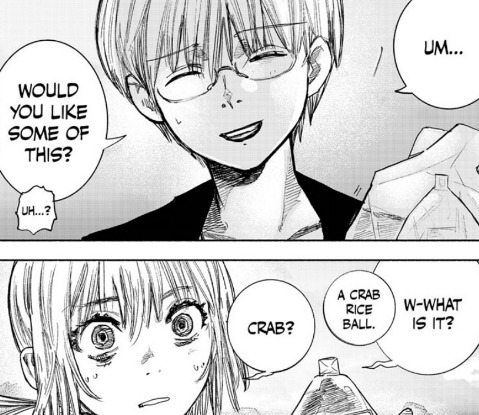
The third is more recent and may just be me going out on a limb here, but Azuma met this clearly supsicious girl searching for corpses on the beach, and didn't really investigate into her any further. Noh Mask met with her shortly after this scene and dragged her into a bigger conspiracy with The Tower / Zora's followers, so she's going to be plot relevant and the fact she ran into Azuma isn't a coincidence. After all, every single detail that happens in a story is purposefully put there by the author to mean something. IE, if they ran into each other once it's likely they'll run into each other again.
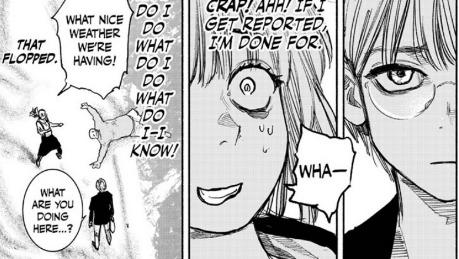
One more important detail is, Azuma's not dumb. He found her right next to a washed up corpse, and even the girl thought she was done before at that point. Only for Azuma to quickly change his tune and act totally oblivious. This is the face he makes, before he smiles and offers her crabs instead. It's likely he actually knew what she was doing there, but for some reason decided to let her go, maybe to investigate her further instead of blowing his cover right there.
While Tokio is the one who is more curious right now about hearing what Zora has to say, he's also steadily growing and gaining influence in Yamato Mori.
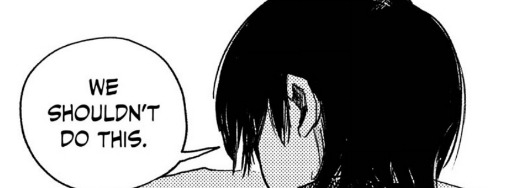
It's Tokio of all people who spoke up against the Opium mission, and Tokio who convinced the higher ups to listen to his plan instead. He's once again the one gaining more strength and confidence, while Azuma's position in Yamato is stagnating. Sato even makes a comment along the lines of Yamato's soldiers not being what they once were.
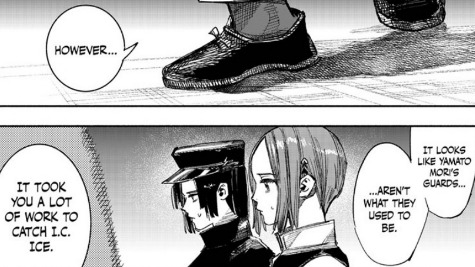
If Azuma isn't making progress with the Yamato Mori, if he's stagnating and not getting any better that's even more reason for him to want to leave.
Evidence of Tokio Leaving
The first and most obvious is that Zora is pretty desperate to choose Tokio as her successor. Tokio is also the one who seemed to have inherited the most power from Zora, as she comments that being an iron choujin makes Azuma unworthy of the mark. In the parallel between the big three Choujin X of the past, Tokio is clearly the parallel to Zora, he uses the same wings and scythe swords she did. Azuma is the parallel to Queem because they both use recurring tank and gun imagery in association with their characters, and Azuma's choujin power seems to have come about because of his obsession with war, weapons, the military, etc...
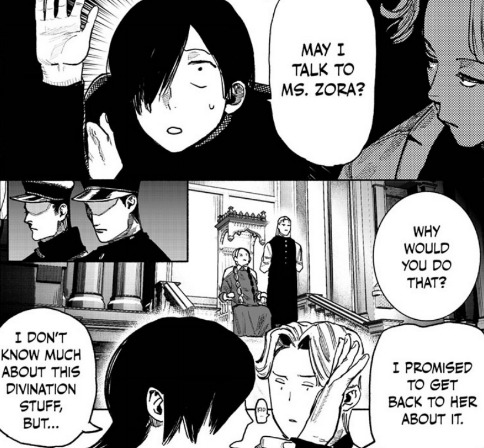
Tokio is also the only one who's spoken in favor of listening to Zora about her prophecy. Azuma's been keeping his head down the entire time just listening to orders in Yamato Mori, Ely even points out that Azuma didn't speak up when he disagreed with Tokio. It's Tokio who's questioning authority and speaking up directly in front of them.
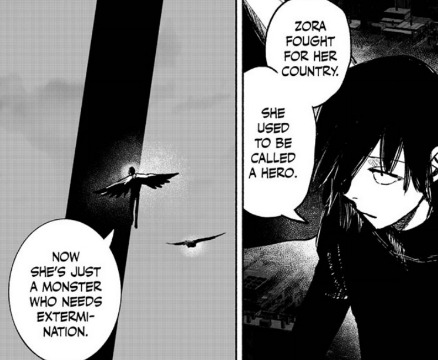
Tokio is also the first person who sympathizes with Zora, when the whole of Yamato Mori who are the ones who cast her out seem only intent on hunting her down. He's expressed a clear interest in talking to her.
Tokio also has been diagnosed with a clear case of Kaneki Ken SyndromeTM! By which I mean Ishida Sui reuses ideas from previous works all the time, and in Tokyo Ghoul his last manga he had the hero defect from Anteiku when he became too afraid that he lacked the strength to protect his friends. Tokio seems to suffer from a similiar fear of losing people. He even resolves to strike Zora down if the danger becomes too much and just ignore her prophecy.
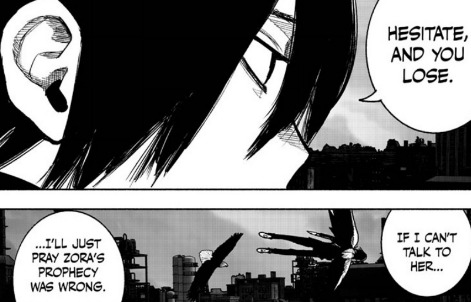
Tokio has also already left once, leaving both Ely and Azuma without a word because he feels he'd become too dependent on them if he stayed. His growth was also jumpstarted when after the island arc he wasn't able to contribute a single thing in the battle because he wasn't strong enough. He could leave for a similiar reason, if Yamato Mori isn't enough to protect his friends he could try to go off on his own and work from the outside instead.
The last piece of evidence is that we still have Tokio's prophetic dream to worry about. Considering Tokio shares so many of Zora's powers, he might have even inherited some of her future seeing.
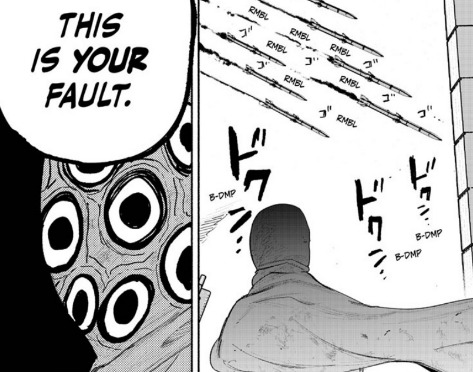
Tokio hasa dream of a ruined Yamato, and an Azuma who turns around to face him and declares that the disaster is all his fault. Tokio defecting / siding with Zora could start the chain of events which leads to this. In a version where Tokio defects, we could see an arc of Tokio joining with Zora, only for Azuma to hunt him down while working with Yamato Mori.
It still fits the general pattern I outlined before of their positive and negative charater arcs, if Azuma stayed with Yamato Mori he might become more like a blind servant to justice, hunting down Tokio no matter what the cost without listening to his friend. Especially if Tokio really is the cause of a disaster.
To mention Ishida's previous work again, Tokio shares a lot of parallels to Arima Kishou, to the point of even wearing glasses like him and having worsening eyesight. The fact that Arima for most of his life was a blind follower of the CCG is not a good thing and led to his tragic ending as a character. So Azuma's character could follow the same general pattern if he chooses to stay with Yamato Mori and hunt down Tokio after he defects.
There's plenty of evidence for either side of the argument, so we may just have to wait and see how it plays out. Considering it's Ishida though, it'll probably be painful when the boys finally do break up.
34 notes
·
View notes
Text

Choujin X, Chapter 39: As You Sleep
Holy character development Batman! We are in this latest chapter seeing the results of Tokio’s year of training and learning to be more independent, not only in just questioning the established authority around him but actually taking responsibility for himself in the investigations. On the other side it seems like Azuma is stagnating or at least not progressing as fast as he wants to which is causing a rift between him and Tokio once again. More on my two favorite boys underneath the cut:
While Tokio seems to have improved by leaps and bounds, I don’t believe this is as shocking of a change in his personality as it seems to be. In the first volume extras there was a character profile for both Tokio and Azuma, where it mentiosn that Tokio despite not seeing himself as smart or talented was able to get into the same high school as Azuma just by studying hard for it.
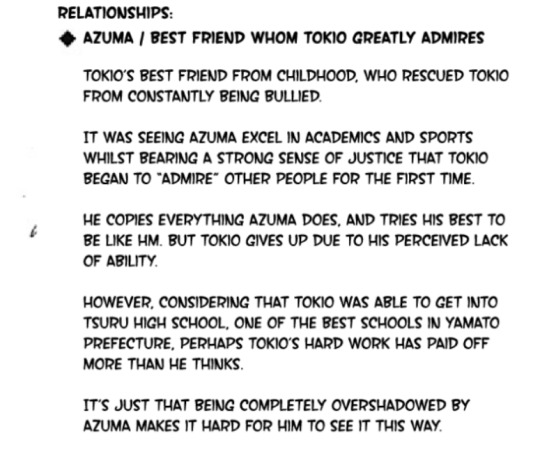
Tokio always had the potential to be just as smart of Azuma, but often self-sabotaged and gave up too quickly because he didn’t believe in himself. This is also something Azuma observes in his own flashbacks of Tokio and resents him for.

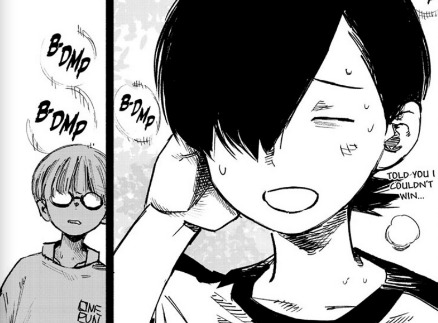
While Tokio’s self sabotage and failing to live up to his potential just comes from regular old lack of self confidence, Azuma has secretly harbored a fear that Tokio thought he was better than Azuma from the beginning and only pretended to be weak around him because he was looking down on him.
While it reeks of Azuma’s own insecurity, it is at times understandable why he’d feel that way, Tokio is naturally talented and capable and for a long time doesn’t make use of those talents and when it seems he finally does he starts far outstripping Azuma. Though, a lot of that may just be Azuma’s perception, Tokio is improving by leaps and bounds but he started off much less skilled so his improvement is more obvious. Azuma is doing the same thing he always does, but he’s been at this for years, his improvement is going to seem more gradual because he’s already that skilled.
One big way that Azuma’s insecurity towards Tokio comes from Azuma’s warped perception rather than the truth is the first event after the time skip, Azuma fails to stop a plane crash that results in the deaths of many people while Tokio seems to have succeeded and become a hero of a nearby district. Of course the truth is they both failed, Tokio’s battle ended in a victory yes but it was at the cost of basically every friend he made during the year timeskip a pyrrhic victory.
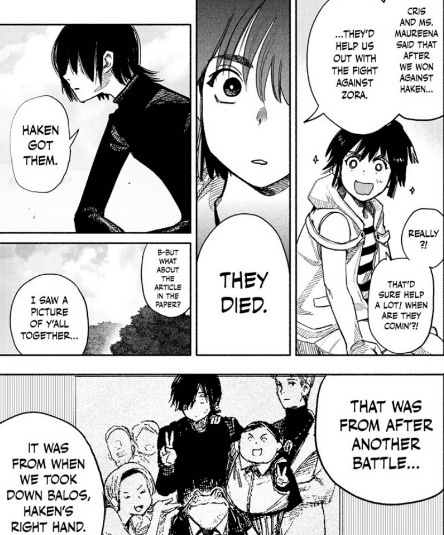
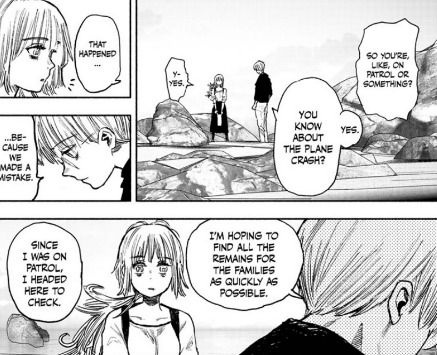
Whereas Azuma’s regrets bout the plane crash are so strong, he’s literally searching the shore for corpses so he can return them to their dead families. Azuma’s perception of Tokio as a hero that’s suprassed him is a false one, based on both his own insecurities and the inability of the two boys to properly communicate with each other. On top of that, the way Tokio left is most likely a big issue, because despite all the problems in their relationship Azuma wanted to be someone that Tokio admired, and Tokio just separating himself from Azuma probably led to Azuma’s fear that Tokio didn’t need him anymore coming true.

As the fledgling vulture takes flight, Azuma realizes that their relationship is no longer what it once was, and there’s no going back for the both of them. I elaborate on this because while we’re shown a lot of progress for Tokio in this chapter (that’s mostly just investigation and exposition scenes which I’ll be skipping over) there’s several indications that Azuma is stagnating.
Azuma doesn’t speak out against Tokio in the meeting, but at the same time we’re shown him in the background drawn in a pretty shadowy way.


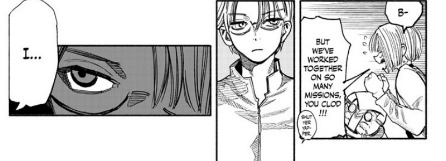

Azuma also does the opposite of Tokio in this regard, while Tokio disliked the plan but openly spoke out about it, Azuma keeps his head down and does the work anyway despite disagreeing. Which is likely due to a lot of things, including his cop father being his main influence. In his character profile it says “to see what is right and not to do it is want of courage”.

Azuma’s a character obsessed with justice, ideology and doing the right thing, but he’s also someone who tends to be blind to his repressed feelings and darker traits. Which is why as mentioned in the panel above, lately his prescription is getting worse from both stress and overwork. His glasses and dwindling eyesight are both a sign that there is something he’s not seeing.
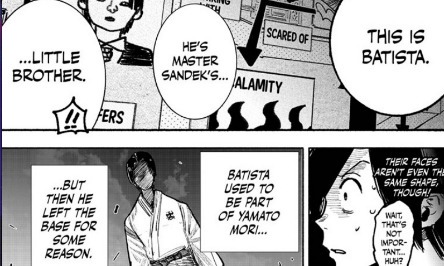
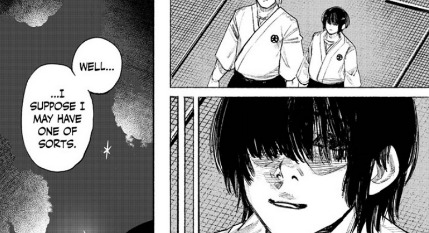
There’s also the mounting Batista and Azuma parallels, Batista is a character never depicted with their eyes shown. Even when we see their unmasked face, their eyes are sewn in the wrong place all over their face. Batista also seems to have been driven to villainry by the falling out between their brother and themselves.
This chapter also draws focus to the fact that despite Tokio has made leaps and bounds in his growth, he’s repeating some Kaneki lines here in regards to his fear of losing others.
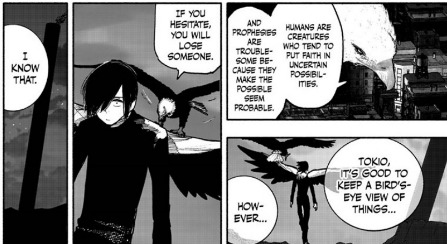

Tokio’s desire to separate himself from Azuma was not entirely about his need to be independent, because he could have just said goodbye to Azuma and been like “I need my space for a year, it’s nothing you did to me I’m just taking this time for myself” but chose the cowards route of just cutting off all contact from him without a proper goodbye. Which reeks of Kaneki the protagonist of Ishida’s previous work Tokyo Ghoul, who also made a decision in the midpoint of the story to abandon all of the friends he made so far at Anteiku out of fear of losing them.
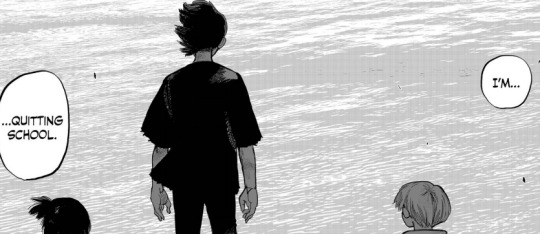
In this case Tokio is more self confident, but he’s being driven by his fear of losing people. That fear is probably made worse by the fact that friends he made over the year he was gone, all died right in front of him and he became the lone survivor. All of this to say, I think the dysfunction in Tokio and Azuma’s relatoinship is a two way street. Azuma is secretly jealous of Tokio and tends to stew in his resentment, but it’s a problem that could be fixed with better communication which won’t happen because Tokio cut him off.
Tokio chose the easier way of just cutting his friends off out of fear of losing them, and now that he’s back he’s basically making no attempts to talk to Azuma even after Ely directly told him to.

Azuma’s growing more and more distant from Tokio, and Tokio won’t try to bridge the distance because he’s too fearful of losing him so might as well keep him at a distance to start, and so these two things hand in hand are likely to play a role in the dwindling of their relationship real soon.
27 notes
·
View notes
Photo

CHOUJIN X, CHAPTER 35 THOUGHTS.
Chapter 35 shows Tokio’s separation from his friends, and the themes of nihilism Ishida weaves into his manga. The central conflict between Tokio and his best friend Azama early on where one of them is referred to as the vulture and the other the lion is a reference to Nietzsche’s philosophy. The lion in particular is one of the three metamorphoses Nietzsche lists in Thus Spoke Zarathustra. In this chapter, Tokio is embarking on his journey through those three metamorphoses which symbolize the three stages of life and development.
1. The Wilderness
Thus spoke Zarathustra is a work in which Nietzsche expounds upon several of his key concepts, including the superman, self-overcoming, and nihilism. The main theme of Thus Spoke Zarathustra is the portrayal of values as either creative and life-affirming, or ascetic and conformist.
The basic idea Nietzsche puts forward in his work is that all ideology, rules and morality of any given society are created rather than inherent. Which means morals and laws and commandments don’t come from gods, they come from human beings. They are the inventions of human beings and enforced by human beings.
Nietzsche’s idea that there’s no inherent morality isn’t suggesting that morality doesn’t exist, or that there are no rules therefore you can do whatever you want, but just that you should not blindly follow the rules. Nietzsche refers to Christianity as the “old morality”, which someone has to shed away in order to be someone who can create their own morality.
Which is why Choujin X primarily being a superhero manga, where characters with super powers fight villains, follow the law and save people as heroes of justice is such a good place for a Nietzschean dissection of morality.
From the start Tokio is identified as a character who basically has no ideals, he begins the manga making no decisions for himself, and just copying whatever Azama does.

Azama is a believer of justice unlike Tokio, who puts a lot of work into studying and martial arts because he believes in his own personal justice. Azama’s introduction in the manga is even the classic saving a woman from a thug attacking her scenario that’s featured in many comic book superhero stories, but what’s important about that scene is TOkio is the one who stumbles upon the woman in trouble and even though he knows he should do something he just sits there and watches waiting for Azama to come help. That says a lot about Tokio’s character, he has no morality or ideals he fights for he’s just a shallow copy of Azama’s ideals.
If the central theme of Choujin X is what Choujin do with their superhuman powers, then Tokio despite suddenly being given power and more power than Azama. Yet, Tokio stays the same old pathetic and indecisive person.
Which is why Tokio needs to go through these stages of metamorphoses, because up until this point in the manga he still had not developed any ideals of his own and instead borrowed from both Ely and Azama at the same time. He was still following the old values. Which makes sense why his separation from Ely and Azama is necessary for his growth into his own individual.
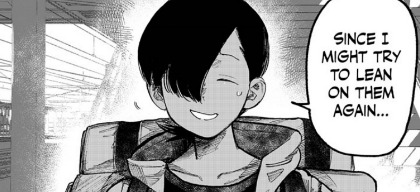
Nietzsche’s three metamorphsoes parallel in Thus Spoke Zarathustra follows three stages. The camel, the lion, and the child. The first stage begins with the camel is suddenly burdened. Nietzsche gives several examples of what those burdens are, but it all boils down to self-examination.
“Why is it heavy? So asketh the load-baering-spirit; then kneeleth it down like the camel, and wanteth to be well laden. What is the heaviest thing, ye heroes? asketh the load-bearing spirit, that I may take it upon me and rejoice in my strength.” (Thus spake Zarathusra).
It’s hard to think for yourself, and it’s easy to follow others. This is the state Tokio was in just before he was told of his potential destiny as the one to stop the destruction of Yamato.


He’s still chained to another person’s belief system. Which is why while Tokio disappearing from Azama and Ely’s life is a little bit selfish and hurtful, it’s also something that was probably necessary for Tokio’s development as an individual.
Nietzsche states the thing that camel does to move onto its next development is to separate itself from others and retreat into the wilderness.
“All these the heaviest things the load-bearing sprit taketh upon itself; and like the camel, which when laden, haseneth into its wilderness.”
(Thus Spake Zarathustra)
Which mirrors the necessary journey that Tokio akes this chapter, to venture into the wilderness and separate himself from others so he can become strong and independent enough to carry his own burdens. In response to Tokio suddenly realizing that he has great power and potentially a great destinty to save Yamato as a choujin and because of that he needs to become someone responsible enough to carry those things.The next phase is the lion.
Which is most likely the stage Azama is at right now. At the stage of the lion , you begin to create your own morality.
All values have already been created, and all created values - do I represent. Verily, there shall be no “I willl” any more. Thus speaketh the dragon, My brethren, wherefore is there need of the lion in the spirit? Why sufficeth not the beast of burden, which is renounceth and is reverent? To create new values - that even the lion cannot yet accomplish: but to create for itself the freedom for new creating - that can the might of the lion do. To create itself freedom, and give a holy Nay ecen unto duty;for that, my brethren there is need of the lion.
(Thus Spake Zarathustra)
Therefore, Azama who already has his own convictions and idea of justice was already at this stage, whereas until this point Tokio was only ever playing catch up to him.

We see the chapter end with Tokio’s journey into the wilderness, because he needs the might of the lion to begin to create his own values and think for himself. The third stage would be child, where Tokio is essentially reborn as a new person, his own person rather than a shallow copy of other people.
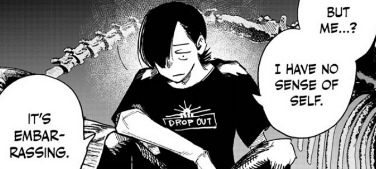
Which is why the ultimate goal in this manga is to become a “Choujin” (the direct translation of this word in Japanese is superman), which relates to the nietzschian idea of the ubermensch.
Nietzsche puts forward we follows these stages of metamorphosis i order to create the ubermensch or superman. Having gone through an old morality, creative spirits can shed the influence of others and ultimately create a new way of being in the world. Such a new being would involve not only a new perspective, but a new set of values with their own rationale.
“There was it also where I picked up from the path the word “Superman” and that man is something to be surpassed. THat man is a bridge and not a goal - rejoiciing over his noontiedes and evenings, as advances to new rosy dawns.” Thus Spake Zarathsutra
Tokio’s journey into becoming the superman has nothing to do with becoming the smartest or the strongest, but learning to be his own person and think for himself without following others.
40 notes
·
View notes
Text
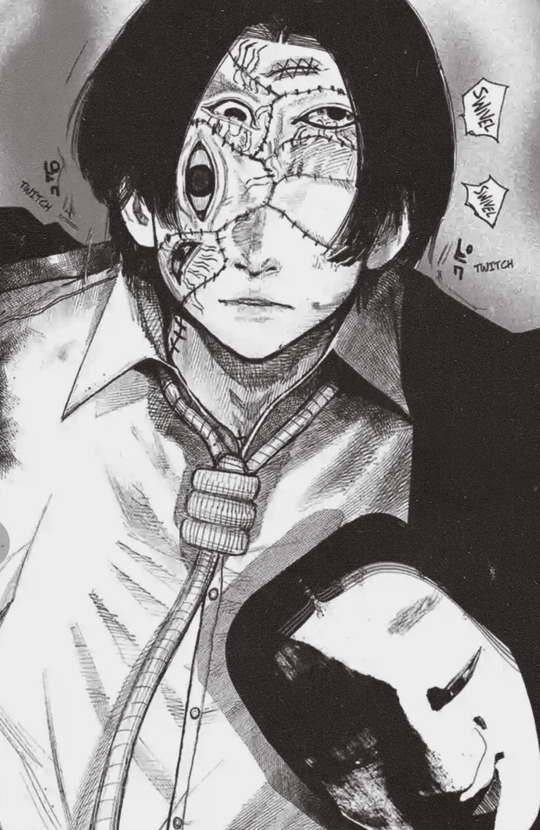
Choujin X, Chapter 34 Part 4 Thoughts.
A lot happened and not only was this chapter the climactic end of a major arc, it also seems to be a major turning point in the story especially in regards to Tokio's character and what is coming next for him. Thoughts and predictions underneath the cut.
1. The Other Brother
Perhaps the biggest reveal this chapter was the face behind the Noh Mask, and as usual for Ishida he actually foreshadowed this reveal long in advance. Now let's play everyone's favorite game of spot the foreshadowing. It started with Batista taking a special interest in Azama when he was previously targeting Tokio as the Beast Choujin.
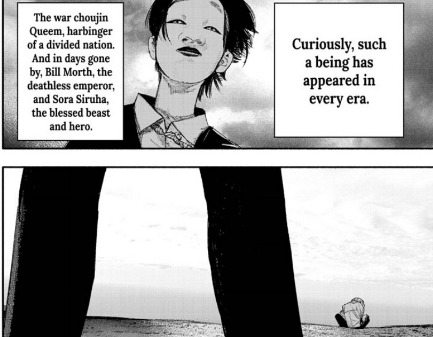
A few chapters later Sendak mentions his reasons for taking an interest in Azama and even councilling him about his habit of losing control and his emotional outbursts is because he resembles his younger brother who fell away from him.
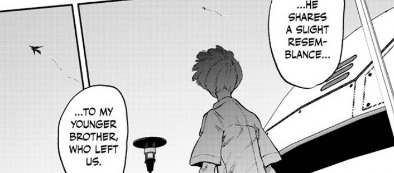
One more thing of note before moving on, while several key characters constantly note how much potential that Tokio has as the beast Choujin, and take an interest in him as someone who has the potential to change the world, it's mentioned over and over again that Azama's powers despite taking a long time to awaken and being hard for him to control aren't really anything special.



After being shown taken an interest in him a the end of Azama and Tokio's fight, Batista then goes out of his way once again to spare Azama and bring him along despite the fact he knows that his choujin ability doesn't really stand out in any way.
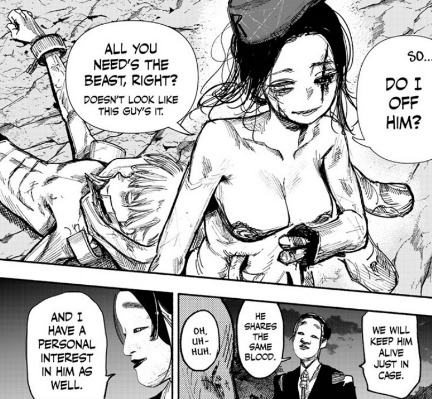
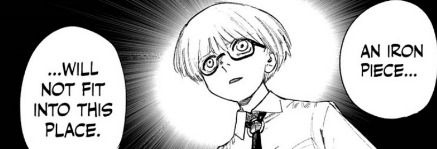

He even goes out of his way to ask for the power of the iron choujin and Ely, and is fine with only getting Azama. Whether he was going to just take Azama's powers from him with what his usual method seems to be (my guess is sewing other people's body parts onto himself considering his face and arm) or actually try to mentor Azama is unknown but he's expressed the same interest in him over and over again other characters have not.
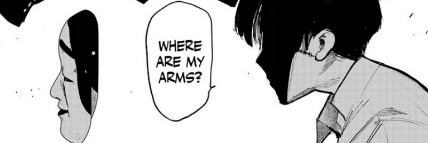
We know nothing of Sendak and Batista's conflict as brothers, however, there is a ton of foreshadowing for the rift that's already begun to form between Azama and Tokio growing wider as the story progresses Just from the nature of the difference between Hosi and Sendak's powers, Sendak's choujin ability seems to be at the peak of strength a Choujin can have. Whereas, Batista as the "chimera" either doesn't have a choujin ability of his own and gains his powers by stealing the body parts of others and grafting them to him, or his power wasn't strong enough to ever face Sendak's which made him resort to alternative means. Or a third option his Choujin ability only works by gaining the powers from body parts of other people he grafts onto himself, he has no natural ability of his own just stolen ones.
This is also the center of the conflict between Azama and Tokio. Tokio is blessed with insane and unique power, and a potential that has everyone targetting him, and he doesn't want it, and doesn't want to decide how to use it either.
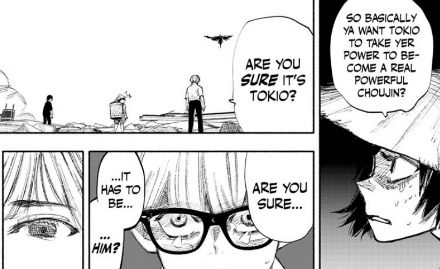
From the moment their powers awakened, Azama who was used to practically being the "hero" of their friendship got slotted into a secondary position. At first Azama didn't experience any change at all and thought he remained a normal person whereas Tokio gained powers and saved him.
Then, even after Azama's powers finally awaken, not only do people constantly comment on how his powers are no good if he loses control of them with emotional outbursts and hurts people which is directly against his self image and ideal of using his powers to help people, but he also despite finally awakening as a choujin is shown time and time again his potential is way less than Tokio's, and everyone is interested in Tokio as some kind of chosen one as he's passed aside.
If the relationship between Azama and Tokio is set to parallel Sandek and Batista then they probably suffered from a similiar fallout, Batista's older brother was one of the strongest choujin in a generation, whereas Batista's chosen method of getting strong was done most likely by stealing from others.
2. The Parting of Ways

The second biggest game-changer this chapter is Tokio's announcement that he is dropping out of school. Considering Azama, Ely and Tokio all attend school together this also probably means that Tokio's reason for quitting is to seperate himself from both of them so he can devote all of himself full time to being a Choujin.
Ishida has a tendency to reuse ideas from his previous works, and Tokio in many ways parallels Kaneki Ken, both of them being reluctant chosen ones, who were granted a great power mostly by mistake. This moment parallels Kaneki's decision at the end of the Aogiri arc in the original Tokyo Ghoul after being kidnapped and seeing Anteiku go to great lengths to try to bring him back, making the decision to not go home with them and instead go off on his own to try to get stronger. He even says it overlooking a body of water similiarly to Tokio.
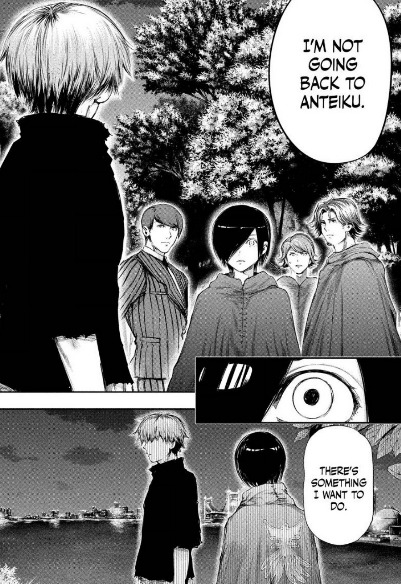

There's not just the Tokyo Ghoul parallel however, Tokio's seperation from Azama and Ely is set up within the story itself. Number one, the whole island arc in general has the setup of a shonen training arc with a twist. In regular shonen manga the trio of Azama, Ely and Tokio would train together, get stronger and then have their friendship solidified. Not only does none of the training any of the characters do pay off (they all just get captured anyway), but the already rocky friendship of Azama and Tokio seems like it's heading towards a seperation rather than bringing them closer together the island arc has even further driven them apart.

Just when they were getting along and both training together as Choujin, Tokio's premonition that Azama would blame him for the destruction of Yamato, and their argument on whether or not Tokio should accept the divine mark only showed the issues of their friendship are still there despite their temporary truce.

Not only that, but Tokio's newfound resolve to be strong enough to stop Azama if he goes out of control again was incredibly shaky to begin with. Almost immediately, an outsider is able to point out the flaw in his logic. That if he ties himself to Azama like that his self esteem isn't going to get any better, and he should find his own reason to fight rather than using someone else as an excuse.
On top of that Tokio is referred to as being shackled to Azama, because of his habit of constantly comparing himself to others, and wanting to be more like others rather than developing himself. His big moment of character development in this arc however comes from choosing to fly. Something he cannot do if he is shackled as flight = freedom.

I did a previous meta on how Tokio's indecisiveness is a sign that unlike the two other members of his group, Ely and Azama who have pretty opposite ideals but have their motivations figured out, Tokio is someone who could go either way on Ely's path, or on Azama's.
In an interesting twist Tokio has taken a third option, rather than becoming closer to Ely or Azama he has made the decision to separate himself from both of them (or at least I'm guessing that is what's going to happen next). If you consider the traumatic series of events Tokio has just been through, this decision makes sense from his perspective. To begin with this training arc was a total loss for all of them, Ely, Azama and Tokio make significant breakthroughs in developing their abilities but it doesn't matter they still get their asses kicked hard.
Tokio is made helpless, kidnapped and dragged into an unsafe environment. Not only that he's reminded how because of his helplessness he couldn't do anything to help Azama or Ely who were kidnapped alongside him. He also learns right away that due to being the beast Choujin, he was the reason the entire island was targetted and Ely and Azama were put in danger. You know just to sprinkle some extra guilt and self-blame on top of the cake.
Tokio reaches a pretty major breakthrough where he realizes instead of worrying about everything, he has to just take a leap of faith and fly (This is a spiderverse reference btw) only to hear the prophecy of the Beast Choujin and to have all of this responsibility and destiny suddenly shunted onto his shoulders and his response is just to revert to his previous indecisiveness.

Not only does his indecision cause all of his friends to get attacked once more, but even going berserk and using his choujin power to the absolute limit of his abilities, Tokio is completely useless in the fight once more.

Tokio witnesses his friends being crushed to death, goes berserk, and it barely makes a difference in the fight. Yes, he is rescued by Sandek shortly afterwards, but Sandeks rescue reminds Tokio that despite being a chosen and being told by the people around him of his potential just how far he actually has to go in terms of mastering his power. He's shown strength on a completely different level from him.

When he is finally rescued too, he is told to sit on a beach and wait, while a bloody battle is fought right in front of him, and his rescue comes at the expense of several choujin offering their lives.

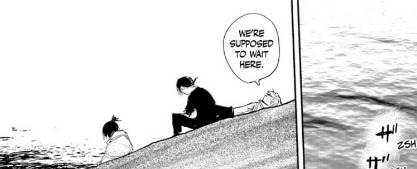
All the while Azama, Ely and Tokio are told to sit and wait because they'd be no help in the fight. Considering all of these circumstances, it's understandable that not only would Tokio blame himself for a lot of this by being so weak and indecisive of a person he needed to be rescued in the first place instead of being able to fight his way out of that situation, but he'd also think the only way to get stronger was to go off on his own and prove he could get stronger without relying on others. To become the kind of person who wouldn't need to be rescued so this kind of situation would never repeat itself again.
If you consider the survivor's guilt associated from surviving a long battle where you were mostly helpless, and even the cause of the battle needing to be fought in the first place, it would make sense Tokio would blame himself and think the only way to move forward is to be strong on his own. Which is why we see at the end of this arc, our three types of heroes, on three different paths, are probably going to drift even further away from each other rather than coming together.
#choujin x#choujin x meta#cx meta#choujin x theory#choujin x analysis#ishida sui#choujin x spoilers#choujin x 34.4#azama higashi#tokio kurohara#ely otta#hoshi sandek#sandek hoshi#batista sandek#chimera choujin
41 notes
·
View notes